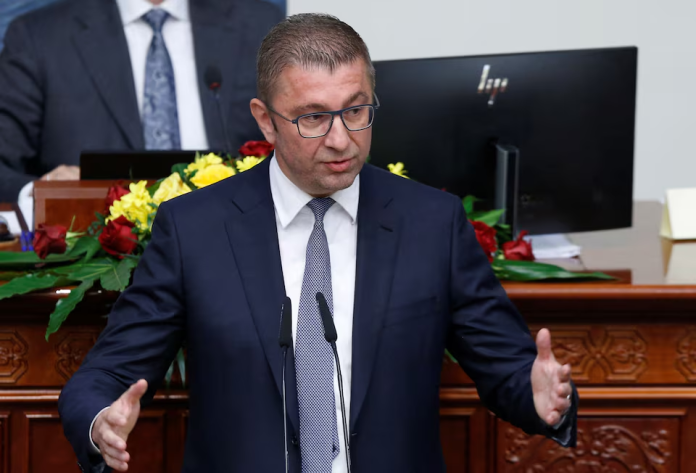The North Macedonian leader secured parliamentary approval to lead a new coalition, according to AP News.
Hristijan Mickoski, 46, faces serious challenges during his four-year tenure to advance the small Balkan NATO member’s long-running efforts to join the European Union.
At the same time, the national focus of his VMRO-DPMNE party is causing resentment among neighboring members of the wealthy bloc, a stark contrast to the previous government, which it defeated in national elections in May.
A total of 77 MPs in the 120-seat chamber voted in favour of the new government, while 22 voted against it. The remaining 21 deputies were absent during the vote. Mickoski’s VMRO-DPMNE-led coalition won 43% of the vote on 8 May, winning 58 seats, three seats short of the governing majority.
Mickoski has promised to continue the efforts of his centre-left predecessors to bring North Macedonia into the EU. However, VMRO-DPMNE’s challenge to key agreements with neighbouring Bulgaria and Greece that could block North Macedonia’s accession could stall the EU project, according to political analyst Petar Arsovski.
(VMRO-DPMNE) basically demands a reinterpretation of both the (deal with Greece) and the agreement with Bulgaria. They will face a serious challenge from the international community, which will treat these agreements as a done deal. I don’t expect them to make a breakthrough too quickly on any of those issues.
North Macedonia joined NATO in 2019 following a historic agreement with Greece to change its official name to Macedonia after decades of disputes over history and cultural heritage. However, VMRO-DPMNE made it clear that it was dissatisfied with the agreement. Speaking at the start of a two-day parliamentary debate that culminated in Sunday’s vote, Mickoski repeatedly used the former name, Macedonia.
North Macedonia’s new president Gordana Siljanovska-Davkova has already angered Greek and EU officials by doing the same when she took the official oath of office. She later insisted that she had the “human right” to call her country whatever she wanted.
Relations with Bulgaria are also likely to suffer. The previous government in North Macedonia accepted, but failed to win parliamentary support for, Bulgaria’s demand to recognise the Bulgarian minority through constitutional amendments. In exchange, Bulgaria agreed to drop its objections to North Macedonia’s EU membership.
EU membership negotiations with North Macedonia and neighbouring Albania began in 2022 and are expected to last years. Mickoski’s domestic objectives include strengthening the rule of law, fighting corruption and poverty, and reviving a sluggish economy.
On Saturday, he pledged to cut taxes and raise pensions while boosting the economy by 5 per cent this year and bringing inflation down to no more than 2.5 per cent.
